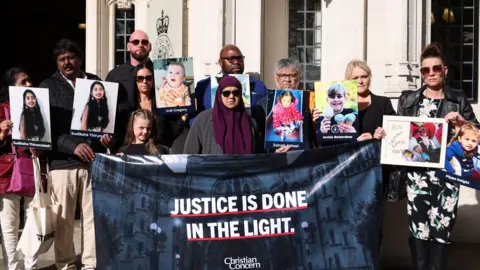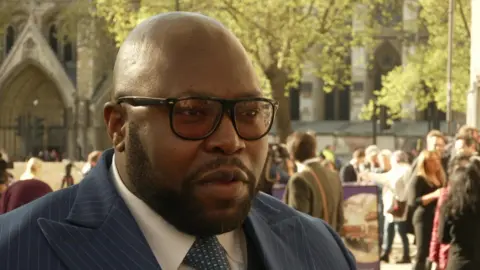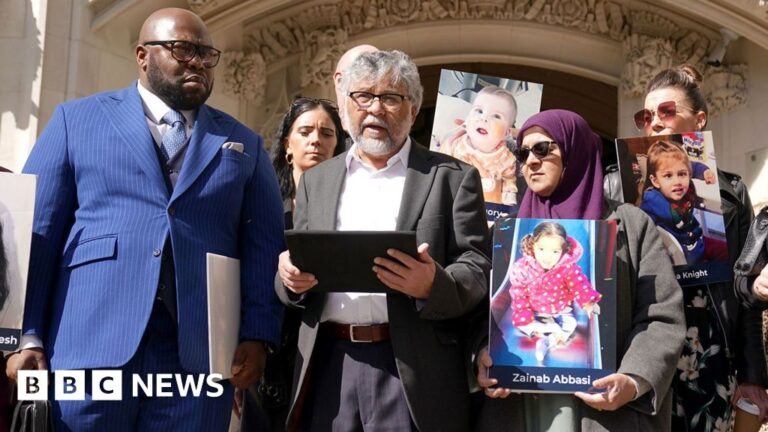BBC News
BBC News, North East and Cumbria
 PA Media
PA MediaDoctors in two end-of-life cases can be named, the Supreme Court has ruled, after the parents of two children said they wanted to “tell their story”.
Isaiah Haastrup, aged 12 months, and six-year-old Zainab Abbasi were at the centre of life support treatment disputes at the High Court in London before their deaths in 2018 and 2019 respectively.
During the proceedings, court orders were put in place barring doctors involved in the children’s care from being publicly named indefinitely.
Giving the ruling, President of the Supreme Court Lord Reed said the need for restriction of freedom of speech must be “established convincingly”, and that it was not by the NHS trusts in the case.
Isaiah suffered “catastrophic” brain damage after being deprived of oxygen at birth and died in March 2018.
Outside the court, Isaiah’s father Lanre Haastrup said the decision would “benefit the public at large”.
“The court has emphatically stated no doctor can hide,” he said.”It’s a great feeling that Isaiah’s life is not in vain.”

Zainab’s parents Rashid and Aliya Abbasi had raised concerns over the care at Newcastle’s Great North Children’s Hospital.
Their daughter was born with a “rare and profoundly disabling” inherited neurodegenerative condition and died in September 2019.
Zainab’s father Dr Abassi said: “We were brutally silenced both before and after Zainab’s death.
“Now, after six years of fighting in courts, we are finally allowed to tell our story.”
Her mother Dr Abbasi said: “If something goes wrong, you should stand up and say, ‘Yes, this went wrong.’
“I can’t imagine how much NHS money has been spent on this court case.”
Unanimous dismissal
A Court of Appeal ruling in 2023 – allowing the clinicians to be named – was challenged by the two trusts involved, in Newcastle and London.
The case was heard at the UK’s highest court in April 2024.
The Supreme Court unanimously dismissed the appeal.
In the written judgment, Lord Reed and Lord Briggs said: “Weight can be given to the importance of protecting the medical and other staff of public hospitals against unfounded accusations and consequent abuse.
“However, the court should also bear in mind that the treatment of patients in public hospitals is a matter of legitimate public interest.”
The court also declined an application from the trusts to continue the injunction for a further 21 days.
The justices ruled that the doctors’ rights could not be asserted on their behalf and that the claim had to be brought by the clinicians themselves.
The Court did not rule on how and when the naming should happen.
Several families, including the parents of Indi Gregory and the mother of Archie Battersbee who were involved in similar high-profile legal battles, also attended the Supreme Court for the ruling.
‘Best interests of patients’
Newcastle Upon Tyne Hospitals NHS Foundation Trust said it continued to extend its condolences to Zainab’s family and it would “take some time to consider the judgement”.
“Throughout these proceedings, we have sought to act in the best interests of patients while protecting the rights of our staff to go about their professional duties and private lives without the potential threat of abuse or harassment.”
It added the ruling confirmed it was “appropriate and reasonable” for the trust to take this action.
King’s College Hospital NHS Foundation Trust said it remained “sincerely sorry for the events surrounding Isaiah’s birth”.
“We accept the ruling of the Supreme Court, and we will continue to support our staff through this change,” a spokesperson for the trust said.
Additional reporting by PA Media



